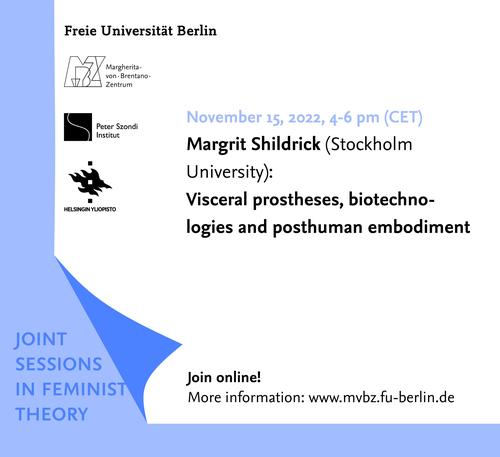Joint Session in Feminist Theory | Visceral prostheses, biotechnologies and posthuman embodiment
Joint Sessions in Feminist Theory, 15.11.2022
Bildquelle: CeDiS FU Berlin, Franziska Wohlfarth
Organized by: Dr. Esther von der Osten, Peter Szondi Institute of Comparative Literature, Freie Universität Berlin, PD Dr. Susanne Lettow, Margherita von Brentano Center for Gender Studies, Freie Universität Berlin, Dr. Tuija Pulkkinen, Department of Cultures, Director doctoral program Gender, Culture and Society (SKY), University of Helsinki.
Input
Margrit Shildrick, Stockholm University
My presentation is rooted in the meaning and philosophical significance of prostheses read through the diverse but interlinked phenomena of disability, organ transplantation and the physiological processes of microchimerism and the microbiome. (In biomedicine microchimerism refers to a small but significant presence of non-self-cells coexisting within a dominant population of self-cells in the same body.) I will examine the complex interfaces between these areas around the question of how our understanding of embodiment is being transformed in the age of advanced biomedical technologies. Where conventional conceptions of prostheses refer to rehabilitation devices that replace or augment impaired parts of the body, I broaden the scope beyond mechanical prostheses to explore visceral organic prostheses, which includes transplants and any cellular material that cannot be identified with the self. In the postmodern era, the interface of bodies, biologies and technologies increasingly challenges not only normative embodiment, but also the very understanding of what counts as human. The deployment of prostheses, both inorganic and more significantly organic, is one major area which demonstrates how embodiment can be varied such that the usual markers of human being – bounded bodies, unique DNA, an enduring sense of self – can no longer be taken for granted. We urgently need to address the issue of posthuman embodiment and it is necessary to think a different future that does not take for granted the wholeness, separation and independence of each body nor human distinctiveness. By gaining a deeper understanding of the conceptual underpinnings, which are fundamentally about the relation between self and otherness, I suggest ways forward in the task of welcoming prostheticised embodiment, whether in the context of disability, donated body parts, or the operation of microchimerism and the microbiome. I use recent continental philosophy, feminist theory and contemporary advances in bioscience to open up the significance of prostheses in revaluing multiple variant forms and in thinking transcorporeality as the very condition of life. The task is to go beyond the dominant bioethical conventions of modernism to facilitate acceptance of transcorporeal and posthuman embodiment.
Join Zoom-Meeting: https://helsinki.zoom.us/j/62221187471?pwd=RElIUGNhaGNIQzRvWENvTUxpU1hjdz09
Meeting ID: 622 2118 7471
Passcode: 861979
Zeit & Ort
15.11.2022 | 16:00 - 18:00
4-6pm (CET)
Join Zoom-Meeting: https://helsinki.zoom.us/j/62221187471?pwd=RElIUGNhaGNIQzRvWENvTUxpU1hjdz09
Meeting ID: 622 2118 7471
Passcode: 861979
